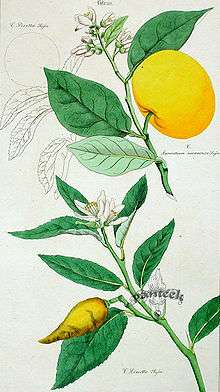Citrus limetta
| Citrus limetta | |
|---|---|
 | |
| Scientific classification | |
| Kingdom: | Plantae |
| Genus: | Citrus |
| Species: | C. limetta |
| Binomial name | |
| Citrus limetta Risso | |
Citrus limetta, alternatively considered to be a cultivar of Citrus limon, C. limon 'Limetta',[1] is a species of citrus, commonly known as sweet lime, sweet lemon, and sweet limetta.
It is native to South- and Southeast Asia and cultivated in the Mediterranean Basin.[2]
- In Iran it is called Limu Shirin (لیمو شیرین, meaning “Sweet lemon” in Persian).
- In North India, it is commonly called mousambi, mosambi, or musambi (मुसंबी)(موسمبى) [3] (in Hindi/Urdu and Marathi).
- In South India, it is called Moosambi in Kannada and Malayalam, Bathaya Kaayalu(బత్తాయి కాయలు)/Cheeni Kaayalu(చీని కాయలు) in Telugu, and sathukudi (சாத்துக்குடி) in Tamil.
- In Nepali, it is called Mausam.
- In Sindh it is known as mosami.
- In France it is sometimes called bergamot; it should not be confused with Citrus bergamia, the Bergamot orange.[4]
It is a different fruit from the Palestinian sweet lime[5] and from familiar sour limes such as the Key lime and the Persian lime.
Description
_Mosambi_at_a_market_in_Seethammadhara.jpg)

C. limetta is a small tree up to 8 m (26 ft) in height, with irregular branches and relatively smooth, brownish-grey bark. It has numerous thorns, 1.5–7.5 cm (0.59–2.95 in) long. The petioles are narrowly but distinctly winged, and are 8–29 mm (0.31–1.14 in) long. Leaves are compound, with acuminate leaflets 5–17 cm (2.0–6.7 in) long and 2.8–8 cm (1.1–3.1 in) wide. Flowers are white, 2–3 cm (0.79–1.18 in) wide. Fruits are oval and green, ripening to yellow, with greenish pulp. The pith is white and about 5 mm (0.20 in) thick. Despite the name sweet lime, the fruit is more similar to a greenish orange in appearance.

C. limetta grows in tropical and subtropical climates. It begins bearing fruit at 5 to 7 years old, with peak production at 10 to 20 years. It is propagated by seed.
Flavor
As the name sweet lime suggests, the flavor is sweet and mild, but retains the essence of lime. The lime's taste changes rapidly in contact with air, and will turn bitter in few minutes, but if juiced and drunk rapidly the taste is sweet. The flavor is a bit flatter than most citrus due to its lack of acidity. It can be compared to limeade and pomelo.
Uses
Sweet lime is almost exclusively served as juice, and is the most common available citrus juice in India, Pakistan and Bangladesh. The juice is commonly sold at mobile road stalls, where it is freshly pressed, sometimes served with a salty chat masala or kala namak, unless the vendor is told not to add it.
Like most citrus, the fruit is rich in vitamin C, providing 50 mg per 100 g serving.[6] In Iran it is used to treat influenza and common cold.
The tree is used for ornamental purposes as well as for graft stock.[2]
| Nutritional value per 100 g (3.5 oz) | |
|---|---|
| Energy | 180 kJ (43 kcal) |
|
9.3 g | |
| Sugars | 1.7g |
| Dietary fiber | 0.5 g |
|
0.3 g | |
|
0.7-0.8 g | |
| Vitamins | |
| Vitamin C |
(60%) 50 mg |
| Minerals | |
| Calcium |
(4%) 40 mg |
| Iron |
(5%) 0.7 mg |
| Phosphorus |
(4%) 30 mg |
| Potassium |
(10%) 490 mg |
| Other constituents | |
| Water | 88 g |
| |
| Percentages are roughly approximated using US recommendations for adults. | |
Checking for ripeness
Like most citrus, sweet limes will not ripen off the tree, and must be picked when fully ripe. This is indicated by its tennis ball size and lustrous greenish yellow sheen. Gently scratch the surface of a sweet lime: If its oils give way in the fingernails, it is ripe. The juiciest fruits feel heavy for their size.
Underripe fruit feels light for its size, and is hard with tart flesh. Overripe fruit is dull and shrunken, with dry, spongy skin. Avoid fruit with brownish-yellow discoloration.[7]
Storage
Sweet limes keep fresh for up to two weeks at room temperature, and four to eight weeks refrigerated. Frozen juice will keep for up to six months. It is possible to freeze slices of the fruit, though the limonin content may cause the pulp to taste bitter over time. This can be avoided by submerging the slices in sweet syrup within an airtight glass jar.
References
- ↑ Porcher, Michel H.; et al. (1995), Multilingual Multiscript Plant Name Database (M.M.P.N.D): Sorting Citrus Names, The University of Melbourne
- 1 2 "Results of your search: Citrus limetta". ars-grin.gov.
- ↑ "Indian Drink – Sharbat Recipes – 2/3 – Indian food recipes – Food and cooking blog". Indian food recipes – Food and cooking blog.
- ↑ What is a Bergamot? David Lebovitz. March 6, 2011. “According to the University of California horticultural website, Citrus limetta Risso (or what are called bergamots in France) ‘are sometimes incorrectly referred to as bergamots.’ ”
- ↑ Palestine at Citrus Variety Collection Website, Volume I See heading: Indian (Palestine)
- ↑ "Nutritive Value of Indian Foods". google.co.in.
- ↑ Catherine Reddy. "The Earth of India: All About Sweet Lime (Mosambi)". theindianvegan.blogspot.in.